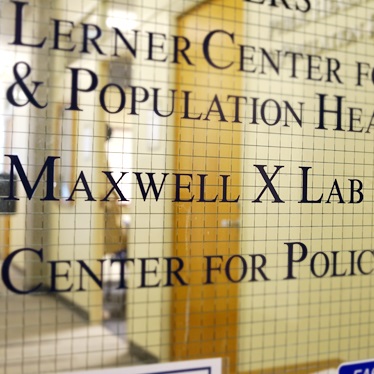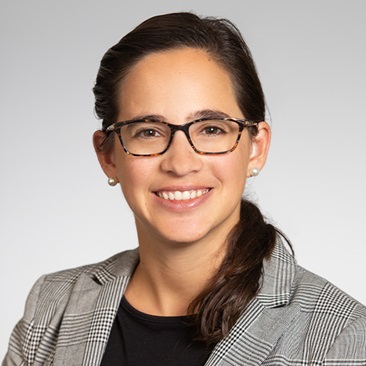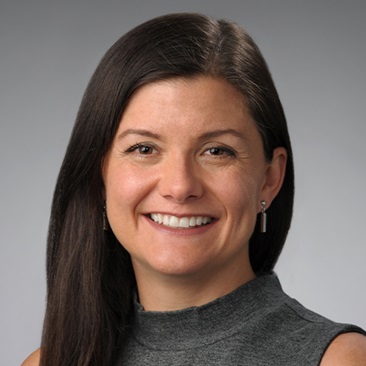$1.5 Million Grant Expands Study of ‘Pay-to-Stay’ Fees for Incarcerated Individuals
February 13, 2024
Gabriela Kirk-Werner, assistant professor of sociology, is among a trio of researchers who’ve launched the Captive Money Lab with the support of Arnold Ventures.
Maxwell School sociologist Gabriela Kirk-Werner is among a trio of scholars who have received a $1.5 million grant from Arnold Ventures to analyze the relationship between the prison system, politics and state finances.
Kirk-Werner and her counterparts have created the Captive Money Lab to study so called “pay-to-stay” statutes that leave millions of incarcerated individuals subject to the partial or total cost of their imprisonment.
The controversial practice contributes to widening inequalities in American society, according to Kirk-Werner and longtime collaborators Brittany Friedman, assistant professor of sociology at the University of Southern California, and April D. Fernandes, associate professor of sociology at North Carolina State University.
Arnold Ventures is a philanthropic organization that supports policy research projects addressing inequities and injustices in American society. Its five-year funding pledge supports the lab’s mission to advance research, policy and advocacy around the political economy of punishment.
Kirk-Werner, assistant professor of sociology, first became interested in pay-to-stay policies in 2016 as a graduate student at Northwestern University. Friedman, a fellow graduate student, had discovered a little-known Illinois statute allowing the state’s attorney general to sue incarcerated people for their prison stay. She submitted a Freedom of Information Act request asking for records on the practice and, intrigued by what she found, joined Fernandes and Kirk-Werner in launching the first in-depth study of states’ pay-to-stay policies, specifically the use of civil lawsuits to recoup money.
“We found that states largely enforce pay-to-stay unevenly, often imposing these laws amid financial turmoil as a means to boost the state’s balance sheet,” says Kirk-Werner.
The researchers witnessed cash-strapped states using pay-to-stay laws, a practice first employed during the Great Depression, to seize stimulus checks amid the COVID-19 pandemic. “States increase their reliance on these laws at will, most likely when prompted by financial hardships and budget shortfalls,” Fernandes explains. “So incarcerated people could be subject to the seizure and collection efforts of the state through pay-to-stay.”
When using civil lawsuits to recoup money, states effectively limit protections for defendants by freezing assets, impacting their ability to find legal representation and to appeal, the researchers say.
Civil lawsuits also increase the potential length of time incarcerated defendants can be subject to collection efforts. Some states extend the pay-to-stay collection period as much as 20 years beyond an individual’s release.
Family Reentry, a Connecticut-based organization advocating for criminal justice reforms, was part of a coalition that in 2022 advocated for the repeal of pay-to-stay in Connecticut, which ended with a partial rollback of the practice. Captive Money Lab researchers submitted written testimony summarizing their findings to Connecticut lawmakers during that 2022 repeal debate and penned a related article published in the Washington Post Post.
Their detailed work on monetary sanctions has earned publication in academic outlets such as Sociological Forum and the Journal of Contemporary Criminal Justice, garnered further national media attention and, ultimately, captured the attention and support of Arnold Ventures.
Fueled by Arnold Ventures’ support, the newly formed Captive Money Lab will expand their national study of state pay-to-stay practices and recoupment strategies.
The researchers will also investigate the impact pay-to-stay policies have on incarcerated individuals and their families. This includes reentry into society, familial connections and the larger consequences for families to build wealth from generation to generation, particularly for Black and Latino communities, which make up the majority of those incarcerated in U.S. prisons.
In addition, the Captive Money Lab plans to conduct a detailed fiscal analysis of the economic costs and benefits of pay-to-stay policies, including if the funds obtained from incarcerated individuals outweigh the costs of state agencies trying to recoup the funds.
To stimulate awareness, discussion and more informed decision-making, the Captive Money Lab has partnered with Hyperobjekt, a digital agency specializing in academic and nonprofit public interest projects, to build a website housing the lab’s public-facing data, policy briefs and academic papers.
By Daniel P. Smith and Jessica Youngman
Published in the Spring 2024 issue of the Maxwell Perspective
Related News
Commentary

Mar 7, 2025
School News

Mar 7, 2025


